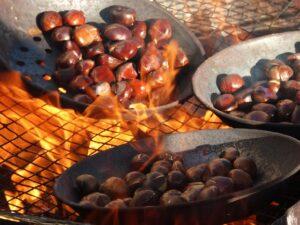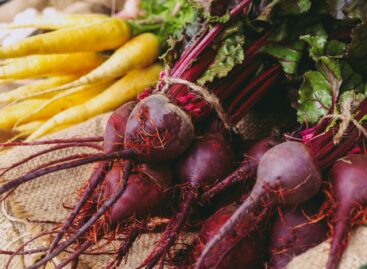Few sweet chestnuts were produced in Europe this year, the processing industry is in trouble
This year was not favorable for sweet chestnuts, the European harvest is far below the average, which also affects the amount of processed products – according to the overview of the National Chamber of Agriculture and the Hungarian Vegetable and Fruit Association, FruitVeB. Although this fruit with a special taste – which is a real vitamin bomb – is very popular among domestic consumers, the domestic production is small, so we need to import a significant amount.

(Photo: Pixabay)
As the holiday season approaches, winter desserts come more and more to the fore, the excellent ingredient of which is the sweet chestnut, which offers a special taste experience. Moreover, in addition to sweets, meat dishes are also enhanced by this nutritious fruit. According to the joint overview of the National Chamber of Agriculture and the Hungarian Fruit and Vegetable Association (FruitVeB), sweet chestnuts are grown on about 281 hectares in Hungary. Special ecological requirements must be met for the cultivation of this shell fruit, as it requires wetter weather, higher humidity and acidic soil. For this reason, only a few regions of the country are suitable for cultivation, so the plant is widespread in the growing regions of southern Transdanubia, western Transdanubia and the Börzsöny Mountains. The largest areas are cultivated in Vas and Somogy counties (75-72 hectares) and in Zala (60 hectares). Since large-scale cultivation technology has not been developed in our country, and in terms of its ecological needs, it is not easy to find a suitable growing area for it, so most chestnut trees are still scattered. For this reason, the national annual yield is typically between 150 and 300 tons. Our exports are negligible, but the demand from the processing industry is significant, so we need to import chestnuts. Imports range from 2,000 to 2,500 tons per year, typically from Italy.
Unfortunately, this year was not favorable for the sweet chestnut
The season was characterized by low yields in our country and in the main growing regions of Europe, and problems appeared mainly in Spain and Italy, as well as in some growing regions of France. The reason for this is that the rainy weather during flowering and the subsequent drought were not good for the trees either, they threw away part of their fruit. The warm autumn weather was not ideal for the crop either and pushed the ripening time, which also favored pests.
Sweet chestnuts are very popular among Hungarian consumers
In addition to roasted chestnuts, which evoke the atmosphere of fairs, they are mostly sold to consumers in the form of dessert. Today, consumers can choose from a wide range of products: flavored purees, organic purees, creams, flour, filled pastries, pre-cooked quick-frozen chestnuts, as well as the truly special chestnut meatballs and scones. At the same time, while the work of domestic processors was made difficult by high energy costs last year – chestnut processing requires significant energy – this year the scarce European crop is causing problems. According to the data of the largest domestic chestnut processor, while 1,200-1,500 tons of chestnuts are processed in an average year, only 500-600 tons of chestnuts entered the plant this year. By the way, sweet chestnuts are a real vitamin bomb: they contain vitamins B1, B2, B6, C, and E, the content of folate (the naturally occurring form of vitamin B9) is not negligible, and it is also rich in dietary fiber. Many people would not think so, but the vitamin C content of chestnuts is as high as that of raspberries and currants. In terms of its content, it contains only a very small amount of fat and no cholesterol at all. Thanks to its high carbohydrate content, it can replace cereals and potatoes in our diet. It is important that, unlike other fruits, chestnuts do not lose their vitamin content even when processed. Traditional chestnut mass and puree also contain a significant amount of valuable vitamins.
NAK
Related news
Not a turnaround, but consolidation: an agricultural outlook for 2026
🎧 Hallgasd a cikket: Lejátszás Szünet Folytatás Leállítás Nyelv: Auto…
Read more >Variety trial: the best varieties received awards
🎧 Hallgasd a cikket: Lejátszás Szünet Folytatás Leállítás Nyelv: Auto…
Read more >Winter frosts may reduce beet supply in the region
🎧 Hallgasd a cikket: Lejátszás Szünet Folytatás Leállítás Nyelv: Auto…
Read more >








